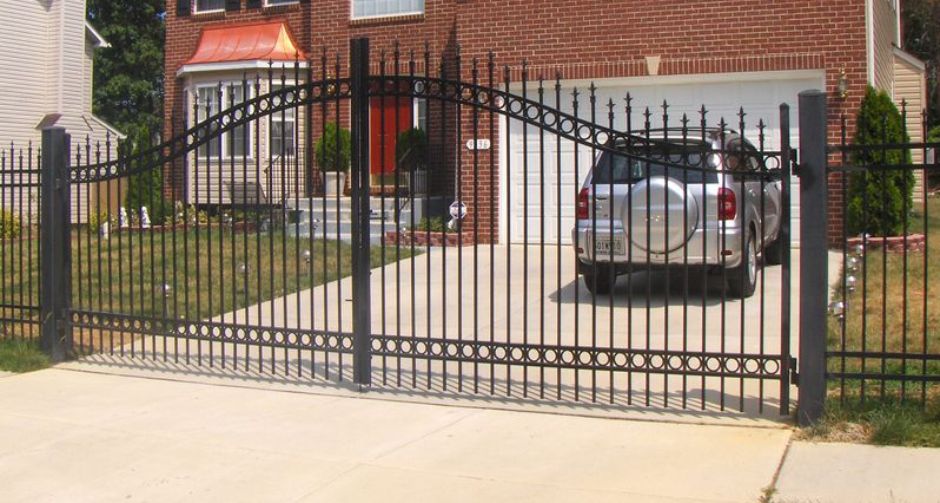Choosing the right gate for your home or property is more than just a matter of security; it’s a statement of style, a layer of privacy, and a functional asset that can significantly enhance your property’s aesthetic appeal and value. With the myriad options available in today’s market, from traditional wood to modern metal designs and from manual to automatic systems, selecting the perfect gate can seem daunting. However, understanding the key factors involved in gate selection makes this much easier.
This comprehensive guide will delve into the various aspects to consider when choosing the right gate for your property. Whether you’re looking for heightened security, increased privacy, unmatched aesthetic appeal, or seamless functionality, we’ve got you covered.
Understanding Your Needs
Before diving into the gate options, assess your needs. A gate is not just a barrier or a passage; it’s an integral part of your home’s first impression, security system, and daily functionality. Here are the key factors to consider:
Security
The primary function of a gate is to secure your property. Consider the level of security you need: Do you require a solid gate that obscures the view into your property? Would a more open, decorative gate suffice, provided it’s robust and equipped with secure locking mechanisms?
Privacy
Your gate can be a barrier to prying eyes. If privacy is a priority, look for designs that limit visibility, such as solid wood panels or metal gates with little to no spacing between elements. The height of the gate also affects how much privacy it offers, so consider a taller gate if you want to keep your property out of view.
Aesthetics
A gate is often the first thing visitors see, making it a significant aesthetic element of your home. The design, material, and color of your gate should complement the architectural style of your home and landscaping. Whether you prefer a classic wrought iron gate that adds a touch of elegance or a modern aluminum gate for a sleek look, the right choice can enhance your home’s curb appeal.
Functionality
Consider how you want your gate to operate, especially if you’re thinking of getting a driveway gate. Manual gates are cost-effective and straightforward but require you to open and close them physically. On the other hand, automatic gates offer convenience and security, allowing you to control access with a button. Consider your daily routine and choose a gate that best suits your lifestyle.
Types of Gates
Each gate type offers unique advantages in terms of design, functionality, and space requirements. Here’s an overview of the most common types of gates you’ll encounter:
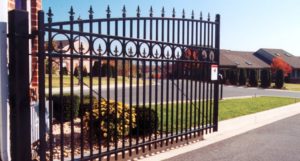
Swing Gates
Swing gates are among the most traditional and widely used types. They operate by swinging open and closed, similar to a standard door. These gates can be single or double-leafed, depending on the size of the entryway. Swing gates require clearance space equal to their width to operate properly, making them ideal for properties with ample driveway space. They can be manually operated or automated for convenience.
Pros: Classic aesthetic appeal; suitable for a wide range of property styles.
Cons: Requires significant space for operation; not ideal for sloped driveways unless designed specifically to accommodate the slope.
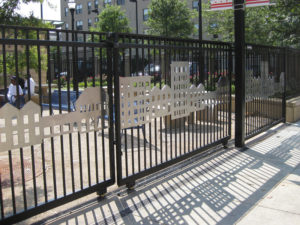
Sliding Gates
Sliding gates are perfect for properties with limited space or sloped driveways. They slide open parallel to the fence or wall, requiring minimal clearance space. These gates can be manual but are often automated, providing a smooth and efficient operation. Sliding gates are a great choice for modern homes and offer excellent security and durability.
Pros: Space-efficient; suitable for properties with limited space or slopes.
Cons: Requires a longer track length (equal to the gate width); may need regular maintenance to keep the track and rollers in good condition.
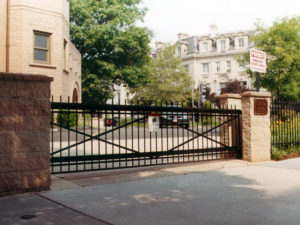
Cantilever Gates
Cantilever gates are designed to ‘float’ across the entrance, without any need for a track across the driveway. This design uses counterbalances and rollers mounted to the fence or wall, making them ideal for areas where a track would be impractical, such as snowy or uneven ground. Cantilever gates are typically automated and offer a sleek, modern appearance.
Pros: No ground track required; suitable for uneven terrain or snowy areas. Cons: Requires more space on the side of the gate for the counterbalance; can be more expensive due to the complex mechanism.
Material Selection for Your Gate
Here’s a breakdown of the most popular gate materials and what each offers.
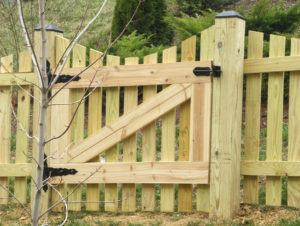
Wood: Timeless Natural Beauty
Wooden gates stand out for their timeless appeal and the warm, natural touch they add to properties. They’re incredibly versatile, suitable for a range of designs from classic to modern. The natural look of wood can be preserved or enhanced with stains and paints, allowing for customization to match your home’s exterior. However, wood requires regular maintenance to protect against weather elements, rot, and pests. Despite its beauty, it may not last as long as metal without careful upkeep.
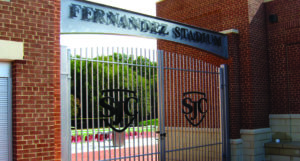
Metal: Strength and Elegance
Metal gates, including iron, aluminum, and steel options, are celebrated for their strength, security, and vast range of design possibilities.
- Iron is the go-to for classic and ornate designs, offering unmatched durability and a prestigious look. Its main drawback is susceptibility to rust, necessitating periodic maintenance to retain its appearance.
- Aluminum gates appeal to those seeking a combination of lightweight, rust resistance, and minimal maintenance. While not as heavy-duty as iron or steel, aluminum is practical for many applications and environments, particularly those near the coast.
- Steel is the pinnacle of strength and durability in gate materials, ideal for those prioritizing security and a modern aesthetic. Though it’s highly resistant to damage, steel needs a protective coating to prevent rust.
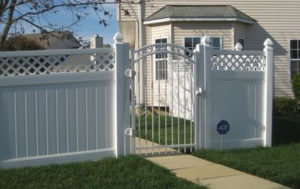
Vinyl: Modern and Maintenance-Free
Vinyl gates are favored for their modern look, ease of maintenance, and resistance to the elements. This material doesn’t need painting or staining and won’t suffer from rust, rot, or pest infestations, making it a worry-free option for many homeowners. While vinyl is durable and offers good privacy, it doesn’t have the same strength or customization potential as wood or metal.
Read More:
4 Questions for Choosing a Fence Gate Design
A Driveway Fence Gate Adds Curb Appeal
Why Build an Electric Estate Gate?

